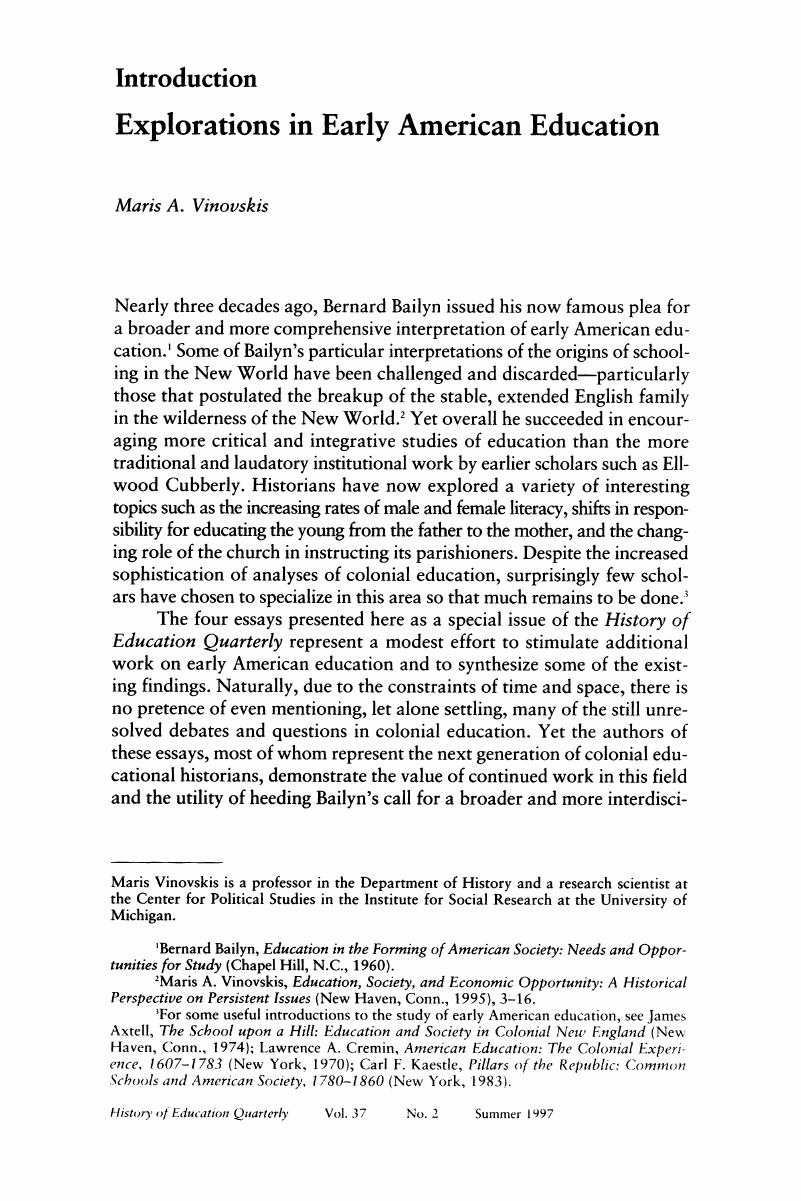No CrossRef data available.
Published online by Cambridge University Press: 24 February 2017

1 Bailyn, Bernard, Education in the Forming of American Society: Needs and Opportunities for Study (Chapel Hill, N.C., 1960).Google Scholar
2 Vinovskis, Maris A., Education, Society, and Economic Opportunity: A Historical Perspective on Persistent Issues (New Haven, Conn., 1995), 3–16.Google Scholar
3 For some useful introductions to the study of early American education, see Axtell, James, The School upon a Hill: Education and Society in Colonial New England (New Haven, Conn., 1974); Cremin, Lawrence A., American Education: The Colonial Experience, 1607–1783 (New York, 1970); Kaestle, Carl F., Pillars of the Republic: Common Schools and American Society, 1780–1860 (New York, 1983). Google Scholar
4 Lockridge, Kenneth A., Literacy in Colonial New England: An Enquiry into the Social Context of Literacy in the Early Modern West (New York, 1974).Google Scholar
5 Regarding those who emphasize the importance of the American Revolution for fostering the literacy of women, see Kerber, Linda K., Women of the Republic: Intellect and Ideology in Revolutionary America (Chapel Hill, N.C., 1980); Norton, Mary Beth, Liberty's Daughters: The Revolutionary Experience of American Women, 1750–1800 (Boston, 1980). Google Scholar
6 On the debates over the role of the home in providing literacy for women, see Moran, Gerald F. and Vinovskis, Maris A., Religion, Family, and the Life Course: Explorations in the Social History of Early America (Ann Arbor, Mich., 1992), 109–39.Google Scholar
7 On literacy in other regions, see Gallman, Robert E., “Changes in the Level of Literacy in a New Community of Early America,” Journal of Economic History 48 (Sept. 1988): 567–82; Tully, Alan, “Literacy Levels and Educational Development in Rural Pennsylvania, 1729–1775,” Pennsylvania History 39 (July 1972): 301–12. Google Scholar
8 On rates of literacy in New France, see Curtis, Bruce, “Some Recent Work on the History of Literacy in Canada,” History of Education Quarterly 30 (winter 1990): 613–24; Magnuson, Roger, Education in New France (Montreal, 1992); Vinovskis, Andris A., “Literacy in Eighteenth-Century Michigan: An Analysis of the Marriage Register at Fort Michilimackinac” (honors thesis, Albion College, 1995). Google Scholar
9 There are major debates among educational historians on the relationship between education and social mobility. Most of these studies focus on the nineteenth and early twentieth centuries, but do not address the situation in colonial America. For introductions to these debates, see Bowles, Samuel and Gintis, Herbert, Schooling in Capitalist America: Educational Reform and the Contradictions of Economic Life (New York, 1976); Graff, Harvey J., The Literacy Myth: Literacy and Social Structure in the Nineteenth-Century City (New York, 1979); Perlmann, Joel, Ethnic Differences: Schooling and Social Structure among the Irish, Italians, Jews, and Blacks in the American City, 1880–1935 (Cambridge, Eng., 1988); Vinovskis, Maris A., “Education and the Economic Transformation of Nineteenth-Century America,” in Age and Structural Lag: Society's Failure to Provide Meaningful Opportunities in Work, Family, and Leisure, ed. Riley, Matilda White, Kahn, Robert L., and Foner, Anne (New York, 1994), 171–96. Google Scholar
10 There has been considerable debate over the extent and impact of a classical education on colonial elites. Gummere, Richard M., The American Colonial Mind and the Classical Tradition: Essays in Comparative Culture (Cambridge, Mass., 1963); Richard, Carl J., The Founders and the Classics: Greece, Rome, and the American Enlightenment (Cambridge, Mass., 1994). Google Scholar
11 On the educational background of the American Revolutionary leaders, see Pangle, Lorraine Smith and Pangle, Thomas L., The Learning of Liberty: The Educational Ideas of the American Founders (Lawrence, Kans., 1993).Google Scholar
12 For example, see Bainton, Roland, Yale and the Ministry: A History of Education for the Christian Ministry at Yale from the Founding in 1701 (New York, 1957); Gambrell, Mary Latimer, Ministerial Training in Eighteenth-Century New England (New York, 1937); Scott, Donald M., From Office to Profession: The New England Ministry, 1750–1850 (Philadelphia, 1978). Google Scholar
13 On the importance of apprenticeship in early America, see Galenson, David, White Servitude in Colonial America: An Economic Analysis (Cambridge, Eng., 1981); Rorabaugh, W. J., The Craft Apprentice: From Franklin to the Machine Age in America (New York, 1986). Google Scholar